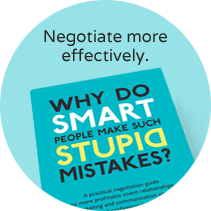Insights

How to avoid the top negotiating mistakes
Here are six common negotiating mistakes. They are often interlinked and exacerbate each other…
Mistake 1:
Thinking it’s all about price. The more we think a customer’s decision is solely based on price, the greater the danger that we allow ourselves to be bought like a commodity.
Mistake 2:
Making hasty decisions under pressure. It comes in many ways: pressure to deliver results for our boss, pressure to hit that deadline or target, or pressure to win the next pitch. Under pressure we make rushed or poorly thought through decisions.
Mistake 3:
Poor pricing strategy. Many companies simply price themselves based on the market rate or what their competitors all charge. This reinforces the belief that your product or service is exactly the same as your competitors’. Why should I pay more for your service or product? Unless you know, you simply become a commodity and encourage your customers to shop around to find the cheapest.
Mistake 4:
Price crumbling. How well do you hold your price when a customer challenges you? If you go straight onto the back foot and start dropping your price, it sends the wrong messages. If anything, the more you drop your price, the more they will want you to drop it even further.
Mistake 5:
Limited negotiation skills. I meet many people who think they can negotiate simply using their intuition or ‘experience’. The danger is that they fall back on using a very small number of negotiation strategies and techniques, simply those that have had some success in the past. Great negotiators have a wide toolbox of strategies, techniques and tools to choose from.
Mistake 6:
Allowing excessive scope creep. Clients will push to get more included after the deal is agreed, expecting them to be included at no extra cost. The weaker you are in responding to this, the more it will cost you.
So how do we start negotiating better and more profitably?
Look at the type of relationship you have with your customer. Is it a ‘buyer-supplier’ relationship, which is primarily transactional, commoditised and bought on price and where you are often kept at arm’s length? Or are you in a peer-to-peer relationship based on trust in your advice, expertise and knowledge? This is typically about value and your ability to help your client or customer be more successful. Or your relationship with your customer may be part way along the spectrum from ‘buyer-supplier’ to ‘peer-to-peer’. Take time to plan how you can move away from the former and towards the latter. Ensure your ongoing customer relationships are a ‘win-win’, with both parties enjoying high satisfaction.
Preparation is so important in negotiation. Yet ‘winging it’ is so common and is often done by those who have been in business the longest. Preparation will aid your confidence and provide specific goals you want to achieve. It will give you more time to think in the meeting and to observe the other party’s reactions and responses. And by preparing properly, you are less likely to agree to something you come to regret later. As part of your preparation, anticipate what the other party might ask you, their likely challenges and objections and their possible reaction to your proposal. Then you can take time to prepare suitable responses that keep you on the front-foot and feeling confident.
Confidence is a crucial ingredient in a good negotiation. Not arrogance, but a genuine confidence based on knowing your value and believing in how you help your customers. You also need confidence in your ability to walk away or simply to say ‘no’. The more prepared you are to say ‘no’ , the more money you will make. Great negotiators put themselves in the other party’s shoes. Understand what your customer really values. Don’t assume – ask. Find out by posing carefully crafted questions. And then actively listen to the answers. Think into the future. What might a short-term, one-off gesture now, turn into in the future?
Think about what precedents you might be about to set that may come back to haunt you. Focus on profitability more than straightforward sales revenue. Profit is the rocket fuel that will provide you and your company with the ability to grow, invest and seize market share. Understand how small changes in pricing can affect your profitability.
Finally, as your negotiation skills develop, your self-belief and understanding of your value will also increase, which will improve your motivation and attitude.

